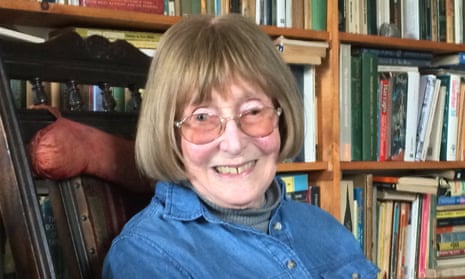Val Mulkerns, who has died aged 93, was a unique figure in the world of Irish literature. Very few women, let alone young ones, played any sort of role in literary, academic or public life in the Ireland of the 1950s, but she thrived and enjoyed success.
Her first novel, A Time Outworn (1951), a tragic love story that deals with issues of the time including partition and the Irish language revival, was published in London when she was 26. From 1952 to 1954 she was an associate editor of the Dublin literary journal the Bell, befriending writers including its founder, Seán O’Faoláin, its then editor, Peadar O’Donnell, and the literary editor David Marcus.
The Bell was Ireland’s most important and radical literary periodical. As Val recalled in her memoir, Friends With the Enemy (2017): “The effect that this little magazine had on the dull and oppressed Ireland of the time was unimaginable.” Val took the job on condition that she could have mornings off to write her own work.
Her second novel, A Peacock Cry, using the classic trope of the Englishman who moves to the west of Ireland, and featuring characters based on literary figures of the day, duly appeared in 1954.
The previous year Val had married Maurice Kennedy, a civil servant and writer, and with the arrival of their children, she put her literary career on ice to some extent. However, in the late 1970s, as Ireland was becoming aware of the general absence of female voices in its literary canon, Val embarked on the second phase of her career as an author.
A collection of stories, Antiquities (1978), was followed by three novels and two further collections of short stories. As soon as she re-emerged, her new work was welcomed with open arms, winning recognition and respect. Soon after Aosdána, the academy honouring outstanding Irish artists and writers, was established in 1981, she was elected a member.
Her final novel, Very Like a Whale (1986), was followed after another long hiatus by Friends With the Enemy and a selection of reissued stories, Memory and Desire (2016).
Born in Dublin, the daughter of the actor Jimmie (JJ) Mulkerns and his wife, Essie (Esther, nee O’Neill), Val grew up in the suburb of Fairview. She went to primary school there, and subsequently to Dominican College, Eccles Street.
Financial constraints prevented her from going to university, so she then worked as a temporary clerical officer in the civil service. Already she was writing and publishing poems and short stories, and around the age of 20 began writing her first novel, at a desk in the reading room of the National Library.
However, in a move characteristic of her independence and sense of adventure, as soon as her civil service post was made permanent she resigned, and went to England to escape what she described as the stultifying and oppressive atmosphere of Dublin. On the boat to Holyhead she was a voluntary emigrant amid the crowds making the crossing from economic necessity.
Although she had no relevant qualifications, she taught for three years in a succession of schools, in Carlisle, Hertfordshire and London. Her charm and talent made her many friends in the literary world, and the novel she had begun in Ireland was published by Chatto and Windus.
All her life Val loved the outdoors. She liked to swim and was an enthusiastic walker (in her later years, when she lived in Dalkey, on the south Dublin coast, she was famous for forcing visitors to climb Killiney Hill – gorgeous but steep). Hiking around Connemara on holiday in 1951, she met, by chance, the novelist Kate O’Brien, who lived in Roundstone. The experience encouraged Val to return to Ireland, and the job at the Bell followed.
Her marriage was very happy; the family lived in a lovely house in the Dublin suburb of Rathgar, which she and Maurice restored. While Val produced no books as she was bringing up her children, she never stopped writing, with a stream of reviews and articles in the Evening Press and other newspapers.
Fiercely patriotic but fiercely critical, she was deeply involved in the protest against the destruction of the Viking Wood Quay by Dublin corporation in the 1970s, and in her 90s joined in marches campaigning for LGBT rights and marriage equality. She strongly wished to repeal the anti-abortion clause in the Irish constitution. Nonetheless, although she had been critical of the Catholic church’s rulings on everything relating to women and reproductive rights from her youth, she was a regular mass-goer. It was her delight to stand up and walk out of the church in the middle of a sermon advising the faithful to vote against the latest attempt to liberate Irish laws from the grip of Rome – divorce, LGBT rights, abortion and so on.
Maurice died in 1992. In 2000 she edited a collection of his writing, The Way to Vladivostok.
Val wrote in the mode of realism, conveying a sense of life in Ireland during her lifetime, and especially of the lives of girls and women. Although she was later dismissive of her first two novels, they provide an invaluable insight into what the country was like in the 1950s. Very Like a Whale examines the changing face of Dublin over several decades.
A feminist before her time – although she resisted all labels – Val was the last of the courageous generation of writers who wrote against the establishment in the days when new Irish fiction, far from being nurtured, was frequently reviled and banned in its homeland.
She is survived by her children, Maev, Conor and Myles.

Comments (…)
Sign in or create your Guardian account to join the discussion